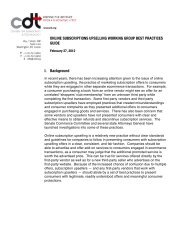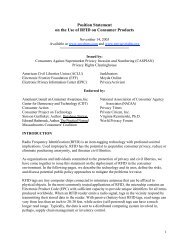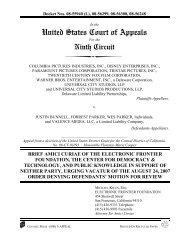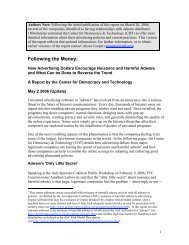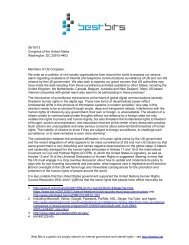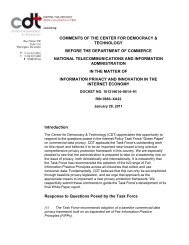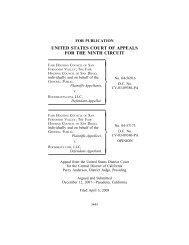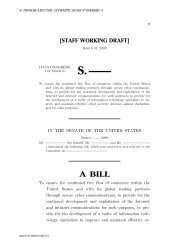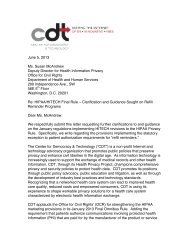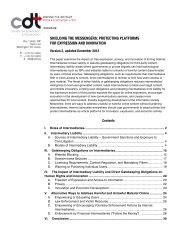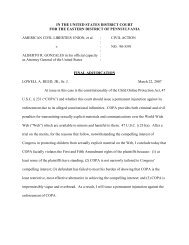hi-res pdf - Center for Democracy and Technology
hi-res pdf - Center for Democracy and Technology
hi-res pdf - Center for Democracy and Technology
You also want an ePaper? Increase the reach of your titles
YUMPU automatically turns print PDFs into web optimized ePapers that Google loves.
<strong>Center</strong> <strong>for</strong> <strong>Democracy</strong> & <strong>Technology</strong> 9<br />
Beware of Potentially Deceptive Fee-Based Download Services<br />
T<strong>hi</strong>nking of signing up <strong>and</strong> paying money to a music download service that looks legitimate <strong>and</strong> perhaps even claims to be “legal?”<br />
Check our list first.<br />
Un<strong>for</strong>tunately, some sites may be happy to take your money, <strong>and</strong> may leave you with the imp<strong>res</strong>sion that they are legal sources of a<br />
full range of music – including the top per<strong>for</strong>mers <strong>and</strong> music labels – but they are not licensed distributors of at least a substantial<br />
quantity of mainstream music. In particular, the sites on our list promote themselves in ways that suggest their music catalog is<br />
relatively comprehensive, when in fact they appear to have done not<strong>hi</strong>ng to license or otherwise ensure the legality of any downloads<br />
from the major music labels. Even where these sites include “legal in<strong>for</strong>mation” cautioning users against illegal downloading, that<br />
in<strong>for</strong>mation is not sufficiently clear, or prominent, or specific to prevent users from mistakenly perceiving the sites as sources of<br />
lawful copies of most mainstream music.<br />
In short, if you are an Internet user in the United States <strong>and</strong> you pay money to one of these services with the intention of being a lawful<br />
online music user, you may get less than you bargained <strong>for</strong>.<br />
Background – CDT Complaint <strong>and</strong> FTC Case<br />
In March 2005, CDT filed a complaint at the Federal Trade Commission (FTC) alleging that two download Web sites were deceptively<br />
claiming to offer “100% legal” music <strong>and</strong> video downloads in exchange <strong>for</strong> a subscription fee. The complaint alleged that users were<br />
led to believe that the subscription fee entitled them to make downloads legally, when in truth the sites merely provided software <strong>and</strong><br />
instructions <strong>for</strong> using free file-sharing networks on w<strong>hi</strong>ch copyright infringement is common. CDT noted that t<strong>hi</strong>s kind of duplicitous<br />
practice can both mislead individual consumers <strong>and</strong>, by sowing confusion, undermine the marketplace <strong>for</strong> legitimate digital download<br />
services.<br />
The Federal Trade Commission brought charges against one of the Web sites, mp3downloadcity.com, obtained an injunction in<br />
federal court, <strong>and</strong> ultimately reached a settlement with the Web site operator in May 2006. The settlement required the operator to<br />
make refunds to customers, to refrain from further misleading claims, <strong>and</strong> to disclose the legal risks of downloading copyrighted<br />
material from peer-to-peer networks.<br />
W<strong>hi</strong>le the FTC case only add<strong>res</strong>sed the practices of mp3downloadcity.com, a variety of other Web sites appear to continue to engage<br />
in behavior that raises similar concerns. Although these sites now avoid overt claims such as “100% legal,” their promotional materials<br />
<strong>and</strong> any discussion of legal issues still offer limited, confusing, or misleading in<strong>for</strong>mation about the true legal status of the downloads<br />
they purport to offer.<br />
CDT’s Music Download Services “Warning List”<br />
(last updated December 2007)<br />
Below, CDT lists the Web add<strong>res</strong>ses of a number of services that, on the surface, may <strong>res</strong>emble fully licensed music download or<br />
subscription services – but upon more careful inspection, appear to advertise or at least imply the availability of music to w<strong>hi</strong>ch they<br />
have not secured the rights. Thus, U.S.-based subscribers/customers of these Web sites download copyrighted music or other content<br />
at their own risk. (We have not investigated whether these sites have licensed or otherwise obtained rights to distribute mainstream<br />
music in other countries.)<br />
Specifically, each Web site on t<strong>hi</strong>s list:<br />
1. Advertises, describes, or promotes itself in ways that either state or imply that its offerings include music from the major record<br />
labels;<br />
2. Charges fees to users;<br />
3. Creates a risk of consumer misunderst<strong>and</strong>ing about the legal status of music downloads available through the site – either<br />
through statements or omissions in the way it characterizes its service or legal status, or by making important legal disclosu<strong>res</strong><br />
too obscure or hard to find to be useful;<br />
4. Does not appear, according to the Recording Industry Association of America, to be authorized to distribute major label music in<br />
the United States – <strong>and</strong> as best we can tell does not disclose that fact prominently to potential users; <strong>and</strong><br />
5. Failed to provide a satisfactory <strong>res</strong>ponse to a letter from CDT, mailed to the add<strong>res</strong>s associated with the Web site’s domain name<br />
registration, providing an opportunity to explain why the Web site should not be placed on t<strong>hi</strong>s list.<br />
when in fact they do not have rights to the songs<br />
they advertise. Such sites have the potential not<br />
just to mislead individual consumers, who may<br />
believe they are paying <strong>for</strong> lawful downloads, but<br />
also to sow confusion that may undermine the<br />
development of the lawful digital content marketplace.<br />
In 2005, CDT filed a complaint with the<br />
FTC regarding a suspicious music download site;<br />
the FTC substantiated CDT’s complaint <strong>and</strong> successfully<br />
pursued an en<strong>for</strong>cement action against<br />
the site in court. In 2007, we continued <strong>res</strong>earch-<br />
Copyright © 2008 by <strong>Center</strong> <strong>for</strong> <strong>Democracy</strong> <strong>and</strong> <strong>Technology</strong>.<br />
The content throughout t<strong>hi</strong>s Web site that originates with CDT<br />
can be freely copied <strong>and</strong> used as long as you make no substantive<br />
changes <strong>and</strong> clearly give us credit. Details.<br />
CDT launched the Download Music Warning List to alert consumers to<br />
potentially deceptive fee-based download services.<br />
ing the issue <strong>and</strong> identified a number<br />
of additional sites that look like<br />
lawful subscription sites, but in fact<br />
are not. Late in 2007, CDT launched<br />
a Web-based warning list to publicly<br />
expose such sites <strong>and</strong> serve as a <strong>res</strong>ource<br />
<strong>for</strong> consumers.<br />
Helping Defeat a Troubling Broadcast<br />
Treaty: CDT participated in a<br />
coalition of public inte<strong>res</strong>t groups,<br />
technology associations, <strong>and</strong> Internet<br />
service providers opposing a<br />
proposed World Intellectual Property<br />
Organization (WIPO) treaty<br />
that would have granted broad, new,<br />
intellectual property-like rights to<br />
broadcasters, cablecasters, <strong>and</strong> possibly<br />
webcasters. In June, the ef<strong>for</strong>ts<br />
of the coalition paid off when the relevant<br />
WIPO working group failed to<br />
reach any consensus on fundamental<br />
questions of scope <strong>and</strong> approach,<br />
causing the treaty drafting ef<strong>for</strong>t to<br />
be shelved.<br />
2008 Objectives<br />
Promote Privacy Principles <strong>for</strong> Watermarking:<br />
CDT will complete its<br />
collaborative ef<strong>for</strong>t to develop privacy<br />
principles <strong>for</strong> digital watermarking<br />
technologies <strong>and</strong> will work to<br />
promote adoption of the principles<br />
by parties involved in implementing<br />
digital watermarking schemes.<br />
Investigate the Policy Implications<br />
of Filtering: Increasingly, intermediaries<br />
such as user-generated content<br />
sites <strong>and</strong> Internet service providers<br />
are being p<strong>res</strong>sured to adopt<br />
filtering technologies aimed at excluding or otherwise<br />
<strong>res</strong>tricting copyrighted content from flowing<br />
into the Internet’s public spaces. The policy implications<br />
of such filtering have not been carefully<br />
explored. CDT intends to release an analysis of<br />
the issues raised by filtering <strong>and</strong> to educate policymakers<br />
<strong>and</strong> other inte<strong>res</strong>ted parties. Our goal<br />
is to promote a more nuanced underst<strong>and</strong>ing of<br />
what is at stake when filtering dem<strong>and</strong>s are made,<br />
<strong>and</strong> how different filtering scenarios may affect<br />
Accomplishments <strong>and</strong> Objectives 2007-2008



